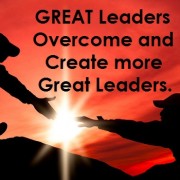Personal Transformation Creates GREAT Leaders
“I have learned that success is to be measured not so much by the position that one has reached in life as by the obstacles which he has had to overcome while trying to succeed.” – Booker T. Washington
I’m a strong beleiver in the idea that GREAT leaders are often those who have experienced personal transformation. I beleive that many leaders have experienced a personal tragedy or run into walls that caused them to radically transform who they are.
In my study of addiction, the twelve-stepper and many of those in recovery will explain that recovery is three-fold. Recovery is physical, emotional, and spiritual. I would argue that there is a fourth level of recovery, intellectual. Addicts who radically transform their lives do so in all four areas.
- Emotional – Addicts who transform their behavior learn to “turn over” the things they cannot control. They give up those external forces that cause them stress and anxiety that push them to drink, use drugs, etc. They learn to calm the emotional roller-coaster that causes them to act out.
- Physical – Addicts who transform become different people in appearance. They end destructive behaviors such as drugs and alcohol and that causes an observable shift in appearance and behavior. They carry themselves different and often dress different. They change there surroundings and make an effort to fit in by removing “character defects” and “short comings” and making amends to those they have personally harmed.
- Spiritual – Addicts use prayer and meditation and create a “Higher Power” (for some it’s their personal definition of God). They use this spiritual connection to create a sense of certainty. This sense of certainty is often expressed in the thought “no matter what happens I will be OK.” Their spiritual connection gives them peace about a future… by the way future is something that nobody can predict.
- Intellectual – Many addicts that transform begin to reevaluate their belief systems and patterns of behavior that caused them to abuse drugs and alcohol. They evaluate the root causes of resentments toward “people, places, and institutions” and understand “their role” in the resentment. This level of intellectual understanding helps the addict to adopt new thoughts that are consistent with a healthier lifestyle.
One of the primary objectives of GREAT Leaders Coaching & Consulting is to draw parallels between personal transformation and organizational transformation. It is my strong belief that the concepts that drive personal transformation are the same as those that drive organizational transformation. However, management gurus and self-help gurus rarely use the same language but the parallels are worth noting.
A widely studied area of leadership is the idea of transformational leaders. My favorite theorists in this area, Bernard Bass, designed a way to measure transformational leadership and broke the theory down into 4 components.
- Individual consideration – Transformational leaders exhibit a great deal of consideration toward the emotional state of their associates.
- Idealized influence (sometimes referred to as Charismatic Leadership) – Transformational leaders act as role models for ethical behavior. They embody the physical image of a great leader.
- Inspirational Motivation – Transformational leaders communicate optimism about future goals. They are visionary and communicate their vision tho that it is encouraging. They provide a sense of certainty about the future of the organization. In my personal opinion certainty about the future is simmilar to having a spiritual connection.
- Intellectual stimulation – Transformational leaders challenge assumptions, and solicit ideas from followers. They use this information to shift or alter current practices, policies and procedures.
On a personal level transformation is experienced. I believe that if a leader has personal experience they are able to express the same values that lead to personal transformation to lead organizational transformation. I believe that in essence organizational transformation is the process of personally transforming every individual to support the change the organization wishes to make. Leaders who wish to transform their organization must develop other leaders who can express concern for employees on an emotional, physical, spiritual, and intellectual level.
GREAT Leaders who suffered from addiction include:
- First Lady Betty Ford
- Robert F. Kennedy Jr.
- Ray Kroc
- J. Paul Getty Jr.
- Buzz Aldrin
- George Bush Jr.
- Not to mention the long list of artists, actors, writers, and creators…

